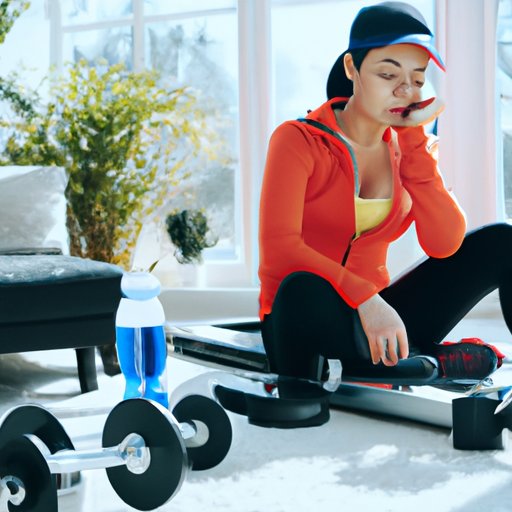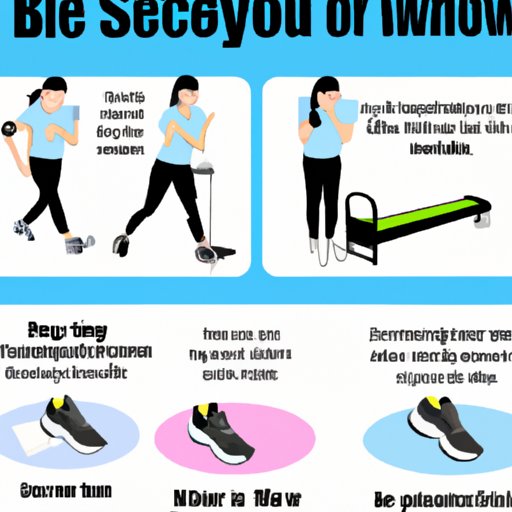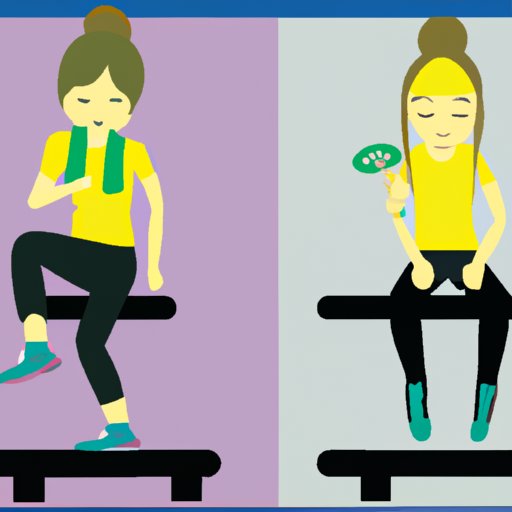Introduction
Working out while sick can be a tricky situation. On one hand, physical activity can help reduce stress, boost immunity, and improve overall well-being. On the other, pushing your body too hard when you’re already feeling under the weather can lead to further fatigue, weakened immune response, and an increased risk of injury. So, is it a good idea to work out when you’re not feeling your best?
In this article, we’ll explore the pros and cons of exercising during illness. We’ll look at how to know if you should exercise while sick, tips for exercising safely despite feeling sick, and what your doctor has to say about working out when unwell. We’ll also discuss strategies for balancing rest and exercise when feeling unwell, and provide some final thoughts and recommendations.

Exploring the Pros and Cons of Working Out When Unwell
Benefits of Physical Activity During Illness
Exercise offers many potential benefits, even when you’re not feeling your best. Physical activity can help reduce stress, boost mood, and improve overall health. It can also help strengthen your immune system, which can help you recover faster from illness. Exercise may even help to minimize the severity of symptoms, such as congestion and coughing.
In addition, physical activity can help to maintain muscle strength and cardiovascular fitness. If you’re unable to do your usual workout routine due to illness, low-intensity activities, such as walking or gentle stretching, can help to keep your body in shape.
Risks of Working Out While Sick
While there are potential benefits to exercising when unwell, there are also risks associated with pushing your body too hard when it’s already weakened by illness. Overworking your body can cause further fatigue, increased discomfort, and a weakened immune response. This can lead to a longer recovery period and an increased risk of injury.
In addition, exercising while sick can put you at risk of dehydration. Dehydration can worsen symptoms and make you feel worse. It’s important to make sure that you’re drinking plenty of fluids before, during, and after exercise to avoid dehydration.

How to Know If You Should Exercise While Sick
Symptoms to Look Out For
If you’re feeling unwell, it’s important to assess your symptoms carefully before deciding whether or not to exercise. Symptoms that may indicate that it’s best to skip your workout include fever, chills, body aches, chest pain, shortness of breath, and nausea. If you have any of these symptoms, it’s best to rest and avoid strenuous activity.
Listening to Your Body
It’s also important to listen to your body and pay attention to signs of over-exertion. If you start to feel worse during or after exercise, stop immediately and take a break. If you’re feeling particularly weak or fatigued, it’s best to skip your workout altogether and focus on getting plenty of rest.
Tips for Exercising Safely Despite Feeling Sick
Choosing Low-Intensity Workouts
If you decide to exercise while you’re unwell, it’s important to choose low-intensity activities that won’t put too much strain on your body. Walking, swimming, yoga, and light stretching are all good options. Avoid high-intensity workouts, such as running, lifting weights, and circuit training.
Paying Attention to Signs of Over-Exertion
It’s also important to pay attention to signs of over-exertion. If you start to feel lightheaded, dizzy, or nauseous, stop immediately and take a break. You may need to reduce the intensity or duration of your workout, or take a few days off to rest and recover.
Making Adjustments to Exercise Regimen
If you’re feeling unwell but still want to exercise, it’s important to make adjustments to your workout routine. Reduce the intensity, duration, and frequency of your workouts until you’re feeling better. Focus on low-impact activities and give yourself plenty of time to rest and recover.
Examining the Risks and Benefits of Working Out During Illness
Possible Positive Health Effects
As mentioned above, physical activity can offer many potential benefits, even when you’re not feeling your best. Exercise can help to reduce stress, boost mood, and improve overall health. It can also help strengthen your immune system, which can help you recover faster from illness.
Potential Negative Side Effects
However, there are also potential risks associated with working out while sick. Overworking your body can cause further fatigue, increased discomfort, and a weakened immune response. This can lead to a longer recovery period and an increased risk of injury.

What Your Doctor Has to Say About Working Out When Sick
Understanding Medical Advice
It’s always a good idea to consult a healthcare provider before engaging in physical activity when unwell. Your doctor can provide advice about the risks and benefits of working out while sick, as well as tips for exercising safely despite feeling unwell.
Consulting a Healthcare Provider
If you’re feeling unwell but still want to exercise, it’s important to speak to your doctor first. Your doctor can provide personalized advice about the risks and benefits of physical activity during illness, as well as tips for exercising safely despite feeling sick.
Strategies for Balancing Rest and Exercise When Unwell
Setting Realistic Goals
When feeling unwell, it’s important to set realistic goals for yourself. Instead of trying to stick to your usual workout routine, focus on low-intensity activities, such as walking or gentle stretching. Give yourself plenty of time to rest and recover between workouts.
Alternating Between Rest and Exercise
It’s also important to alternate between rest and exercise. Make sure to get plenty of rest between workouts and take breaks as needed. This will help to ensure that you’re not pushing your body too hard when it’s already weakened by illness.
Taking Breaks as Needed
Finally, be sure to take breaks as needed. If you start to feel worse during or after exercise, stop immediately and take a break. If you’re feeling particularly weak or fatigued, it’s best to skip your workout altogether and focus on getting plenty of rest.
Conclusion
Working out while sick can be a tricky situation. On one hand, physical activity can help reduce stress, boost immunity, and improve overall well-being. On the other, pushing your body too hard when you’re already feeling under the weather can lead to further fatigue, weakened immune response, and an increased risk of injury.
In this article, we explored the pros and cons of exercising during illness. We looked at how to know if you should exercise while sick, tips for exercising safely despite feeling sick, and what your doctor has to say about working out when unwell. We also discussed strategies for balancing rest and exercise when feeling unwell.
Ultimately, it’s important to assess your symptoms carefully and listen to your body. If you’re feeling unwell, it’s best to skip your workout altogether and focus on getting plenty of rest. If you decide to exercise, make sure to choose low-intensity activities, pay attention to signs of over-exertion, and take breaks as needed.
By understanding the risks and benefits of working out while sick, you can make informed decisions about your health and exercise routine. Remember to always consult a healthcare provider before engaging in physical activity when unwell.
(Note: Is this article not meeting your expectations? Do you have knowledge or insights to share? Unlock new opportunities and expand your reach by joining our authors team. Click Registration to join us and share your expertise with our readers.)
